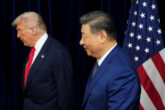June 10, 2024
Next UN Afghanistan Talks in Doha Must Hold Taliban to Account on Human Rights
The United Nations is preparing to host its third meeting of international envoys to Afghanistan in Doha later this month. This is a promising initiative aimed at developing a coherent and unified international approach to engagement with the Taliban at a time when women are facing extreme repression by the fundamentalist regime and the Islamic State Khorasan Province (ISIS-K) is using its base in the country to launch international attacks. ISIS-K conducted a major strike in Moscow in March that killed more than 140, which followed an ISIS-K attack in Iran in January that killed almost 100.
The Taliban refused to take part in a previous U.N. meeting in Doha in February, citing the participation of non-Taliban Afghan civil society representatives and human rights activists. But Taliban leaders have said they are considering participating in the forthcoming gathering. The group’s presence in Doha would be desirable, but only if the U.N. and international community continue to press them on human rights — especially of women and girls — and to include participation of other Afghan activists and civil society leaders in the discussions. If the Taliban refuse to accept these conditions, the U.N. should still host the meeting without the group’s participation and focus it on developing a more unified and coordinated international approach to dealing with Afghanistan’s challenges.
Even the Taliban’s persecution of women and girls not only violates international human rights norms and conventions, but also may be linked to the risks of violent extremism.
There was hope that recent U.N. activity on Afghanistan was beginning to create an international process through which the Taliban would be held to account on human rights issues. In November 2023, the U.N. released its Independent Assessment on Afghanistan, which laid out a road map for engagement with the Taliban that required improvement in women’s rights before the U.N. would consider officially recognizing the group as the governing entity of the country. In December 2023, the U.N. Security Council passed Resolution 2721 calling for Afghan women to be involved in a political process on Afghanistan and for the establishment of a U.N. envoy on Afghanistan that would lead international engagement in the country.
However, it has been six months since the resolution was passed, and there is still no U.N. envoy. There must be more urgency to U.N. efforts, including the initiative to designate “gender apartheid” (what is currently taking place in Afghanistan) as a crime against humanity.
Unfortunately, countries like China and Russia are starting to normalize diplomatic ties with the Taliban, despite its egregious human rights record. China accepted a Taliban ambassador in Beijing in January 2024, and the Taliban again attended an annual economic forum in St. Petersburg this week that has long been one of President Vladimir Putin’s personal flagship events. Moscow also is likely to soon remove a terrorist ban on the Taliban that has been in place since 2003. The delisting will mean little in practical terms, since the U.N. continues to sanction several Taliban leaders for their involvement in terrorism and these U.N. sanctions are binding on Russia, but the move would improve Russia’s ties to the Taliban still further and put Moscow one step closer to official recognition of the group. Unless the U.N. maintains momentum on its Afghan human rights initiatives, the international community will lose a valuable opportunity to try to bring the country more in line with international human rights standards.
Read the full article from Just Security.
More from CNAS
-
Chinese Maker of Bitcoin-Mining Machines Is a Security Threat, Says Expert
Bloomberg News reports that a Chinese manufacturer, Bitmain Technologies Ltd, that sells most of the world’s Bitcoin-mining machines — including 16,000 of them to a venture ba...
By David Feith
-
Indo-Pacific Security / Energy, Economics & Security
North Korea’s Provocations, Power Plays, and Shifting AlliancesTensions on the Korean Peninsula have reached a new and dangerous threshold. President Lee Jae Myung is warning of a real risk of accidental military clashes, as the situation...
By Dr. Go Myong-Hyun
-
Indo-Pacific Security / Energy, Economics & Security
How to Win the Economic War with ChinaTrump's approach to China has run aground, giving Beijing unprecedented advantage in the economic conflict....
By Edward Fishman & Julian Gewirtz
-
Indo-Pacific Security / Technology & National Security
Sharper: Tech + ChinaRecent talks between President Donald Trump and Chinese Communist Party General Secretary Xi Jinping placed a spotlight on emerging technologies, from high-end chips to minera...
By Charles Horn & Sevi Silvia




